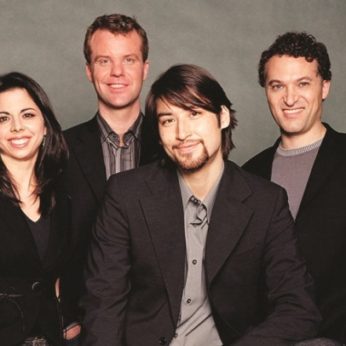It always seems fitting to conclude a festival involving more than one string quartet with a string octet. However this becomes quite a challenge as Mendelssohn’s youthful classic can get over-exposed, and, once Enescu, Bruch and Shostakovich have been sampled, the choice can lead us to lesser-known figures like Johan Svendsen. He was a Norwegian composer-conductor, three years older than Grieg, and for a period in the 1870’s they worked together trying to revitalise Norwegian musical life. Unfortunately for Norway the Royal Danish Theatre in Copenhagen offered him a post as Kapellmeister in 1883 and he remained in Denmark for the rest of his life. Sadly once he moved there he also gave up composition.
However he was clearly a great conductor for on the occasion of Svendsen’s sixtieth birthday, the Danish composer Carl Nielsen wrote the following tribute: Anyone who has played under Svendsen’s baton will never forget the experience, partly because he has been so inspired and partly because he has seen what tremendous vitality can be conveyed from one individual to many others. He is an outstanding conductor, unquestionably the most brilliant in Europe since Bülow. It’s no wonder that the Norwegians take personal offence at the fact that he is living in Denmark, and that other countries are constantly inviting him to appear as guest conductor.
He wrote the Octet when he was studying under Reinecke at Leipzig Conservatory, although he had the work written, rehearsed and performed before his teacher saw a single note of it. Reinecke’s irritated response was to tell Svendsen to be sure to bring him a symphony next, whereupon the young composer promptly returned with the first movement of a symphony. Such was the Octet’s immediate impact that, unusually for a student composer, the publishing house Breitkopf and Härtel offered to publish it soon after the premiere.
It is a big work of an almost orchestral nature full of bold harmonic and rhythmic ideas. The first movement is dominated by the strongly rhythmic opening subject, whose driving force soon takes over even when other more lyrical ideas are being explored. The Scherzo conjures up something of the Romantic obsession with dark spirits that fly by night but more Weber than Mendelssohn. The huge slow movement can be surprisingly gentle but it also generates the exciting level of momentum you would expect from a much larger band, which undoubtedly was what endeared him to the Leipzig audience in 1865 and many audiences since. The last movement begins quietly and moderato as if out of respect for the emotional impact of the slow movement, but it soon livens up into a boisterous finale.
